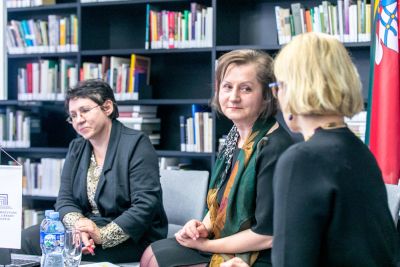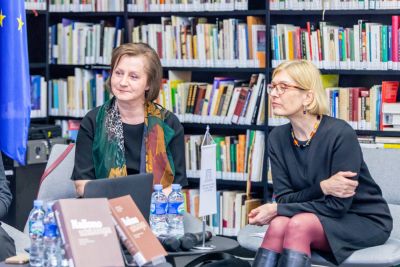

Book presentation at the Library.
Photo: National Library of Lithuania
The two-volume monograph Nylon Curtain. Lithuanian Music in the Context of International History of Cold War, by the musicologists, Prof. Rūta Stanevičiūtė, Prof. Danutė Petrauskaitė, and Prof. Vita Gruodytė, was presented at the National Library of Lithuania. The book, published in 2018 by the Lithuanian Academy of Music and Theater, consists of two volumes: a collective monograph, entitled Nylon Curtain. Cold War, International Exchanges and Lithuanian Music and a collection of correspondence, Foreign Correspondence of the Lithuanian Musicians, 1945-1990.
In the collective monograph, the authors using extensive archival documents gathered from the state and private archives, as well as published sources, analyze the channels of the exchange of musical information among the individuals and institutions in Lithuania and foreign countries that took place during the Soviet period. They also looked into the reasons that encouraged promoting personal and transnational relations between the two musical environments divided by the ideological confrontation of the Cold War, and posed questions, such as: which ideological, economic, and cultural constraints and differences limited such exchange and what impact international exchanges had on the national music scene.
The publication is polyphonic and multidisciplinary. It analyzes the relationship between music and geopolitics: musical exchanges between Lithuanians and Poles during the Cold War and Lithuania’s geopolitical situation. The publication also focuses on cultural co-operation, for example, the relations of Lithuanian-Americans with the occupied Lithuania and contacts of the Soviet institutions with the Lithuanian diaspora. In the second volume, letters written by and to Vincas Bacevičius, Antanas Marijošius, Elena Navickaitė-Martinonienė, Vytautas Landsbergis, Juozas Strolys and other representatives of music are published.
The metaphor “Nylon Curtain” was borrowed from the Hungarian historian György Péter, who suggested using it in order to be able rethink the relations of the communist countries with the rest of the world during the Cold War. The authors of the publication note that the metaphor gave them the opportunity to look at people’s personal relations.
The two-volume monograph reflects and implements authors’ intention to extract the history of Lithuanian music from a closed national and Soviet cultural context and to link Lithuanian music development, life of Lithuanian musicians and their professional career with world-wide political, economic, and cultural processes.